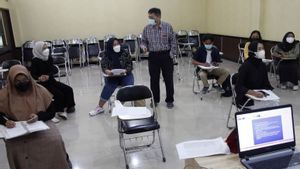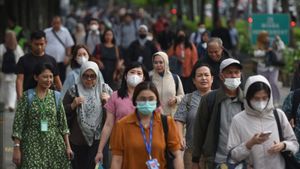JAKARTA - The Ministry of Health stated that the number of anxiety disorders experienced by the community increased by 6.8 percent during the COVID-19 pandemic.
"The latest research conducted by the Health Research and Development Agency of the Ministry of Health found an increase in anxiety disorders of around 6.8 percent", said the Sub-Coordinator of the Substance of Mental Health Problems for Children and Adolescents of the Ministry of Health, Dr. Juzi Delianna, M. Epid in a discussion on Equality in Mental Health. For all who participated online in Jakarta, reported by Antara, Friday, October 8.
He said in addition to the number of anxiety disorders, the number of depression disorders also increased by 8.5 percent. So if you look at the projected population in Indonesia, it really requires serious handling.
Based on data from the Ministry of Health throughout 2020, as many as 18,373 people experienced anxiety disorders, more than 23,000 experienced depression and around 1,193 people attempted suicide.
According to her, the increase in the percentage of anxiety and depression disorders could increase due to a decrease in hospital visits and inpatient occupancy before the COVID-19 pandemic. However, during a pandemic, patients experience a relapse phase.
SEE ALSO:
Based on data from the Association of Indonesian Mental Health Doctors (PDKJI) in the first five months of the COVID-19 pandemic, it was stated that the most psychological problems were found at the age of 17 to 29 years and the elderly population aged over 60 years.
He explained that suicidal thoughts were mostly carried out in the productive age population. 15 percent think about dying every day and 20 percent think about ending life some days of the week.
"From the data shows, one in five people have thoughts about it is better to die", said Juzi Delianna.
Meanwhile, the Director of Prevention and Control of Mental Health and Drug Problems at the Ministry of Health, Celestinus Eigya Munthe, said that to overcome this problem, his party has made efforts so that all health centers can provide mental health services.
However, of approximately 10,000 health centers throughout Indonesia, only about 6,000 health centers provide mental health services. This is due to several factors, namely the lack of health human resources and the lack of adequate infrastructure.
"So that mental health services that should be implemented in primary health care facilities are still not fully implemented in all hospitals", she said.
She explained that although not all health facilities provide these services, mental health services carried out at health centers can be handled and financed from the National Health Insurance (JKN) owned by BPJS Kesehatan.
Through JKN, she said, patients can make referrals to health centers. If the health center turns out to be unable to cope with mental health problems, the patient can be referred to the nearest mental hospital or a general hospital that provides mental health services.
If the patient has been declared stable, the hospital can refer the patient back to the health center. So that people can access drug collection services without having to travel long distances to the hospital to pick up drugs.
She said that to facilitate public mental health services during the COVID-19 pandemic, her party had provided complete medicines needed by patients at the health center.
"We also encourage that currently, almost all mental hospitals in Indonesia have Tele counseling applications as an extension of their efforts to provide counseling services to the community", said Celestinus Eigya Munthe.
The English, Chinese, Japanese, Arabic, and French versions are automatically generated by the AI. So there may still be inaccuracies in translating, please always see Indonesian as our main language. (system supported by DigitalSiber.id)


















